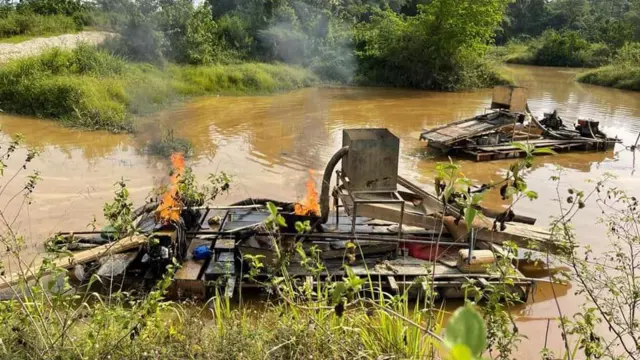Illegal mining, locally known as “galamsey,” continues to devastate Ghana’s water bodies, causing severe environmental damage and threatening public health and livelihoods across the country. The surge in illegal mining activities, driven by rising global gold prices, has led to widespread contamination of rivers and streams with toxic substances like mercury and cyanide, rendering water sources unsafe for human and agricultural use.
Environmental and Health Impact
Illegal miners extract gold by excavating riverbanks and washing soil with water, often using mercury and cyanide to separate gold from ore. These chemicals leach into water bodies, contaminating rivers such as the Pra and Bonsa, which supply drinking water to hundreds of thousands of Ghanaians. Mercury, which can remain in the environment for up to 1,000 years, bioaccumulates in fish and crops irrigated with polluted water, disrupting ecosystems and the food chain. This contamination poses serious health risks including neurological disorders and skin diseases for communities dependent on these waters.
The Ghana Water Company Limited has reported turbidity levels in affected rivers reaching 14,000 NTU, far exceeding the 2,000 NTU threshold for effective water treatment, forcing water treatment plants to reduce output by up to 75 percent. In some regions such as Tarkwa-Nsuaem, water treatment facilities have been shut down multiple times due to pollution, leaving residents without reliable access to clean water.
Socioeconomic Consequences
Beyond water pollution, illegal mining has destroyed thousands of hectares of farmland, including vital cocoa plantations. The Ghana Cocoa Board estimates that over 19,000 hectares of cocoa farms have been lost, contributing to declines in production and threatening the livelihoods of farmers. Some farmers have been coerced or forced to sell their lands to miners, exacerbating rural poverty and food insecurity.
Government Response and Challenges
The government has launched initiatives such as the Blue Water Initiative, training 2,000 youth as “Blue Water Guards” to protect and restore polluted water bodies. Military style training by the Ghana Navy aims to curb illegal mining operations and rehabilitate affected rivers. However, enforcement remains challenging due to alleged complicity of some officials and financiers of illegal mining, as well as poverty driving local participation in galamsey.
Former President Nana Akufo-Addo’s administration deployed military forces under “Operation Halt” to combat illegal mining, but activists criticize the lack of a clear, sustained strategy. The new government under President John Mahama has pledged to prioritize legislation banning mining in forest reserves and near water bodies and to work with the Environmental Protection Agency to remediate polluted rivers.
Public Outcry and Future Outlook
Communities affected by water pollution have staged protests demanding clean water access, but these demonstrations have sometimes been met with police resistance. Environmental groups like WaterAid warn of a looming water crisis if illegal mining is not decisively addressed, with over 60 percent of Ghana’s water bodies currently polluted. Without urgent action, Ghana risks long-term environmental degradation, public health crises, and economic losses in agriculture and fisheries.
Illegal mining in Ghana is severely contaminating water bodies, destroying ecosystems, and endangering human health. While government initiatives show promise, sustained political will, enforcement, and community engagement are essential to halt galamsey and restore the country’s vital water resources.
The Review
Shadow Tactics: Blades of the Shogun
Illegal mining, locally known as "galamsey," continues to devastate Ghana’s water bodies, causing severe environmental damage and threatening public health and livelihoods across the country.
PROS
- Good low light camera
- Water resistant
- Double the internal capacity
CONS
- Lacks clear upgrades
- Same design used for last three phones
- Battery life unimpressive
Review Breakdown
-
Design
-
Performance
-
Camera
-
Battery
-
Price




















